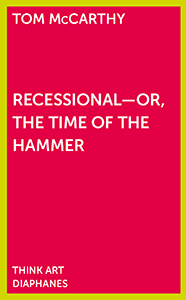British novelist Tom McCarthy questions the specific obsession with
time in modern and contemporary
literature, examining the works of Thomas Pynchon,
J. G. Ballard,
Maurice Blanchot, Thomas Mann, Joseph Conrad, James Joyce, and William Faulkner. The essay is followed by a conversation with the author in which he discusses his own practice of writing.
In this essay, based on a talk he gave in Zurich, award-winning British novelist Tom McCarthy (Remainder, C, Satin Island) unearthes a pattern, a rationale that is working both in and against the canon of modern(ist) literature, of authors such as Thomas Pynchon, Maurice Blanchot, Thomas Mann, Joseph Conrad, James Joyce and William Faulkner. McCarthy tackles a specific obsession with time that haunts their works; a time that is marked by arrest, pause, suspension, interval, eternal moments, tool-downage, waiting. Recessional time, as it were. Time-out-of-time. This is precisely that time (or tense) of fiction that is central to Tom McCarthy's own writing. The essay is followed by a conversation with the author in which he discusses his own practice of writing.
Tom McCarthy (born 1969 in London, where he lives and works) is a British artist and writer. He is general secretary of the
International Necronautical Society, a semi-fictional avant-garde network, and has published numerous stories and essays.
Remainder, his first novel, received the Believer Book Award in 2008.
See also
Holding Pattern (edited by Tom McCarthy).

